The product recommendations in this post are recommendations by the writer and/or expert(s)
interviewed and do not contain affiliate links. Meaning: If you use these links to buy
something, we will not earn a commission.
Having excess gas can derail your plans in a matter of seconds. If you were planning on putting on your favorite pair of jeans or the fitted dress you’ve been dying to wear out, being gassy can cause enough stomach pain to make you think twice about putting on these flattering outfits, let alone even leaving the house. If you’re someone who often feels this discomfort after eating or drinking but hasn’t been able to pinpoint why, finding the right supplements for gas relief can help you carry on with your life until you find the bigger issue.
But what even causes gas and bloating in the first place? This is a multifaceted issue, but some of the common causes are eating too many high-fiber foods, drinking a lot of carbonated beverages, or having an underlying issue related to your gastrointestinal tract and digestion. This excess gas can cause bloating, pain, discomfort, and yes, the very uncomfortable sensation of passing said gas in public.
For some immediate relief to have in your cabinet or to take on the go when you’re going out to eat, check out these six dietitian-recommended supplements for gas relief. Then for more digestion tips, check out 16 Foods To Help You Poop Immediately.
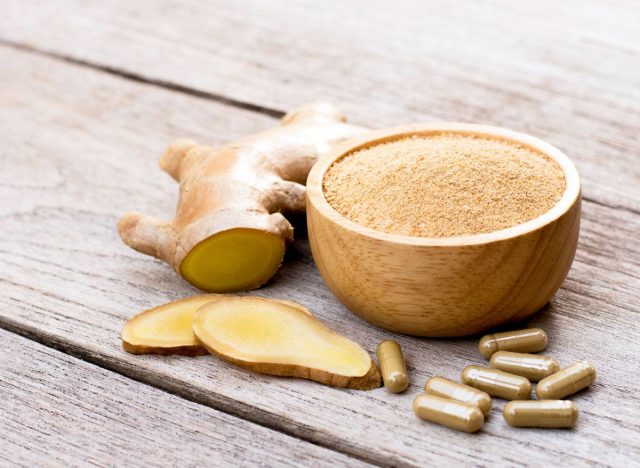

Ginger—whether consumed as the root, in powder form, or as a pill—is known to help relieve stomach pain and potentially help reduce gas. “It promotes smooth digestion, thereby helping to reduce gas production, by its natural ability to relax the gastrointestinal tract’s muscles,” says Trista Best, MPH, RD, LD at Balance One Supplements. “Gingerol, an anti-inflammatory compound, can also help to reduce gas by soothing the stomach and reducing bloating.”
Lauren Manaker, MS, RDN says “If you don’t have fresh ginger handy, this root in supplemental form, like NOW Foods Ginger Root, may be a helpful finale to your repast.”
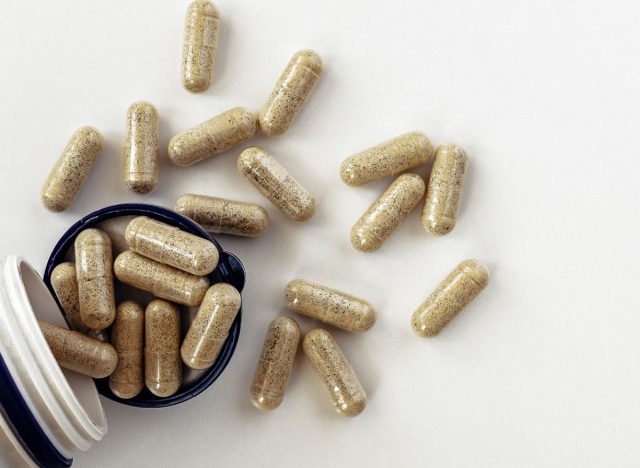

An effective supplement for gas relief is digestive enzymes, which are proteins made by your body for the purpose of breaking down food. Sometimes, your body may not be making enough of its own, so taking them in supplement form can help relieve excess gas or cramps.
“For some, digestive enzymes are what the body needs to [reduce flatulence],” says Manaker. “According to one study, people with inflammatory bowel disease who took digestive enzymes, along with some other interventions, experienced a reduction in bloating and flatulence after four weeks of treatment.
But how exactly do they work? “These enzymes work to relieve gas and other digestive concerns by breaking down food molecules into smaller, easier-to-digest components, and by doing so, they are able to aid the digestive process and reduce the amount of potential food that goes undigested, which ultimately turns into a food source for gut bacteria to ferment and produce gas,” says Best.
If you’re looking for some enzymes to buy, Manaker recommends Life Extension Enhanced Super Digestive Enzymes, which is a gas relief supplement that “contains 10 enzymes that may help people who need the additional supplementation.”
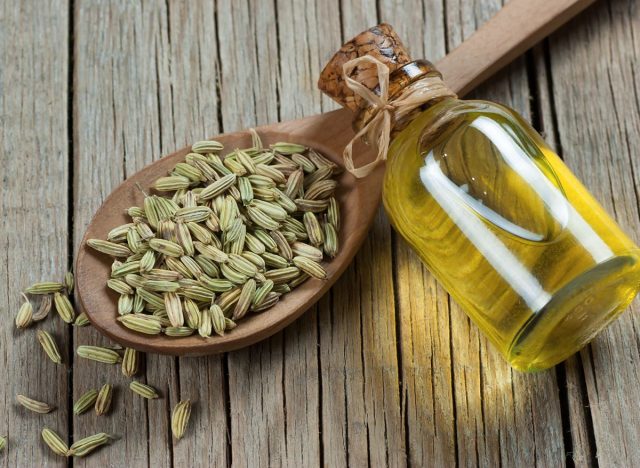

Fennel is a vegetable used in a variety of cuisines for its strong flavors and aromas, but in oil form it has also been known to help provide stomach and gas relief.
“Fennel seed oil may help reduce gas production by inhibiting the activity of digestive tract bacteria that create uncomfortable gas, and because of this, taking a supplement with fennel seed oil may offer some gas and bloat relief,” says Manaker. “Combining fennel seed oil with artichoke leaf and ginger root extract may offer even more benefit, because the latter two ingredients may help ‘move food along’ your digestive tract, which may offer gas relief too.”
READ RELATED: Which Sam's Club Membership Is Best for You? Here Are the Perks of Each Tier
When searching for a combination like this, Manaker suggests choosing Life Extension Bloat Relief, “which is made with a combo of fennel seed oil, artichoke leaf, ginger root extract, and turmeric for even more gas and bloat relief support.”
Another option is using the fennel seed oil by itself, which can be added to water or can even be used topically on your stomach.
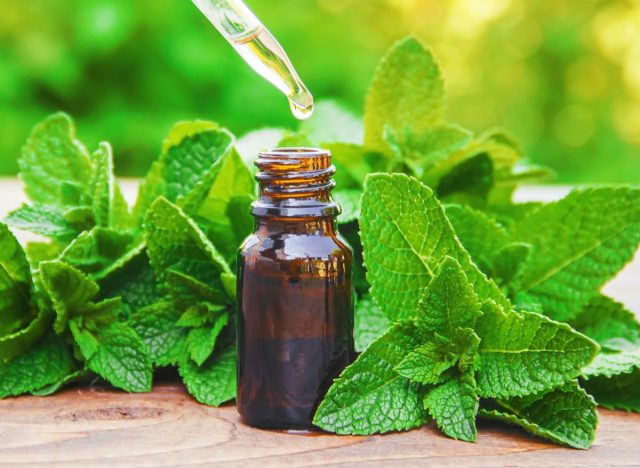

Similarly to fennel seed oil, peppermint oil can offer relief in moments when you’re feeling gassy or bloated.
“Peppermint oil is known to relax the muscles located in the GI tract, therefore, in supplement form, it may help relieve gas and bloating,” says Best. “Menthol, the active compounds in peppermint oil, have a calming effect on the smooth muscles of the intestines, and this relaxation can reduce spasms and contractions that can contribute to the buildup of gas and bloating. Peppermint oil may also help to promote the movement of food and gas through the digestive system, aiding in the overall relief of gas symptoms.”
You can consume this oil by adding just a couple of drops to water or tea, or you can apply it directly to your stomach to benefit from the muscle relaxation qualities.


Star anise is another option for those looking for instant gas relief supplements. “Some people believe that taking it may help combat this uncomfortable situation,” says Manaker, and if you’re looking for supplements with star anise, “Gaia Herbs Gas and Bloating is made with this spice, “along with other ingredients like activated charcoal, which may help with gas relief too.”
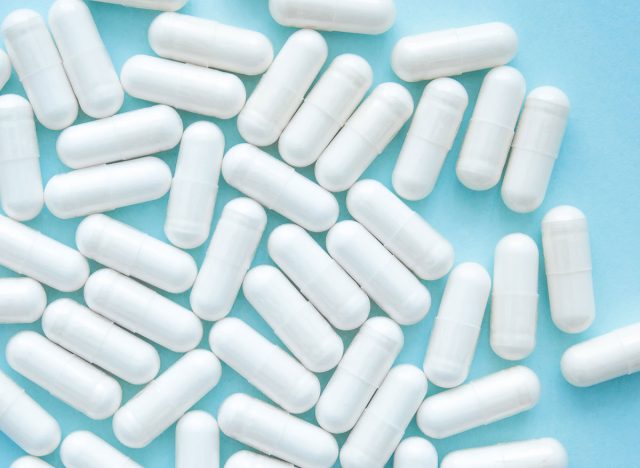

Technically, probiotics may be a bit of a longer-term solution to gas rather than instant relief, but if you’re caring for your gut health with this supplement, the hope is that you’ll experience much less gas overall.
“Probiotics promote a healthy balance of gut bacteria, which may help relieve—and even prevent—gas and bloating,” says Best. “The digestive process is more efficient when the gut’s flora are in equilibrium, thereby producing less gas due to undigested and fermented food particles. Probiotics are also able to assist in the breakdown of certain carbohydrates that may also contribute to gas production.”
Manaker notes that “a combination of Lactobacillus and Bifidobacteria may be the ticket to gas-free days ahead.” If you’re looking for a specific recommendation on which probiotic to buy for gas relief, Manaker suggests Thorne FloraMend Prime Probiotics, “which have an ideal combination of these two strains, helping to colonize your gut with these beneficial bacteria that may combat gas.”










